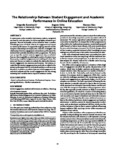The Relationship Between Student Engagement and Academic Performance in Online Education
| dc.contributor.author | Kuzminykh, I | |
| dc.contributor.author | Ghita, B | |
| dc.contributor.author | Xiao, H | |
| dc.date.accessioned | 2022-11-07T11:32:21Z | |
| dc.date.available | 2022-11-07T11:32:21Z | |
| dc.date.issued | 2021-08-21 | |
| dc.identifier.isbn | 9781450390156 | |
| dc.identifier.uri | http://hdl.handle.net/10026.1/19860 | |
| dc.description.abstract |
In recent years, online education has become a mature, recognised, and heavily used alternative for delivering higher education programmes. Beyond its benefits, online education faces a number of challenges, some of which relate to its engagement and impact on student performance. To support the ongoing research into the complex relationships developed, this research investigated the relationship between engagement and academic performance for students that undertake standalone online programmes. The study uses as input the module content engagement data, as collected from an e-learning platform, including the number of content views, forum posts, completed assignments, and watching of videos. The study used Pearson correlation to evaluate the relationship between learner engagement and academic performance. The analysis revealed that the student engagement was positively correlated to the student performance both for individual modules as well as across the cohort. In addition, correlation between initial engagement with individual subjects and the overall engagement was also strong, indicating both variables lead to improved academic results. | |
| dc.format.extent | 97-101 | |
| dc.language.iso | en | |
| dc.publisher | ACM | |
| dc.title | The Relationship Between Student Engagement and Academic Performance in Online Education | |
| dc.type | conference | |
| dc.type | Conference Proceeding | |
| plymouth.conference-name | ICSET 2021: 2021 5th International Conference on E-Society, E-Education and E-Technology | |
| plymouth.publication-status | Published | |
| plymouth.journal | 2021 5th International Conference on E-Society, E-Education and E-Technology | |
| dc.identifier.doi | 10.1145/3485768.3485796 | |
| plymouth.organisational-group | /Plymouth | |
| plymouth.organisational-group | /Plymouth/Faculty of Science and Engineering | |
| plymouth.organisational-group | /Plymouth/Faculty of Science and Engineering/School of Engineering, Computing and Mathematics | |
| plymouth.organisational-group | /Plymouth/REF 2021 Researchers by UoA | |
| plymouth.organisational-group | /Plymouth/REF 2021 Researchers by UoA/UoA11 Computer Science and Informatics | |
| plymouth.organisational-group | /Plymouth/Users by role | |
| plymouth.organisational-group | /Plymouth/Users by role/Academics | |
| dc.rights.embargoperiod | Not known | |
| rioxxterms.versionofrecord | 10.1145/3485768.3485796 | |
| rioxxterms.licenseref.uri | http://www.rioxx.net/licenses/all-rights-reserved | |
| rioxxterms.type | Conference Paper/Proceeding/Abstract |


